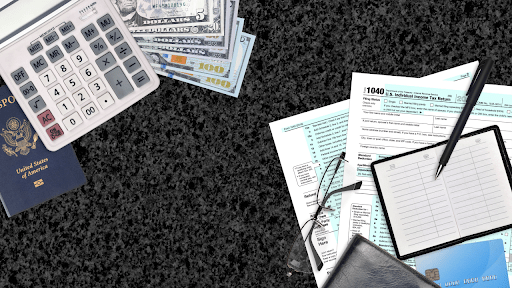
IRS Debt and Passport: What You Need to Know Before Traveling
How IRS Debt and Passport Restrictions Are Connected
IRS debt and passport restrictions can affect your ability to travel abroad. When unpaid tax debt reaches a certain threshold, the IRS can notify the U.S. State Department, which may deny your passport application or even revoke an existing passport. This process is part of a federal enforcement effort aimed at collecting seriously delinquent tax debts.
What Is a Seriously Delinquent Tax Debt?
A seriously delinquent tax debt is defined by the IRS as an unpaid, legally enforceable federal tax debt totaling more than $62,000 (adjusted annually for inflation), including interest and penalties. It also must meet these conditions:
- A federal tax lien has been filed
- A levy has been issued, or a notice of intent to levy was sent
However, not all tax debts qualify. The IRS does not certify debt if:
- You are in a formal installment agreement
- You have a pending Offer in Compromise
- You have requested innocent spouse relief
- Your debt is classified as Currently Not Collectible due to hardship
How the Passport Revocation Process Works
Once the IRS determines your tax debt meets the criteria, it will send a CP508C notice, which informs you that your debt has been certified to the U.S. State Department. The process includes:
- IRS sends a certification of your debt to the State Department
- The CP508C notice is mailed to your last known address
- The State Department can deny new passport applications or revoke existing passports
There’s no waiting period once this certification occurs, so your ability to travel may be impacted immediately.
What to Do If You Receive a CP508C Notice
If you receive a CP508C notice, do not ignore it. There are several ways to resolve the issue:
- Pay the debt in full if possible
- Set up a payment plan (Installment Agreement)
- Submit an Offer in Compromise to settle the debt for less
- Request currently not collectible status if you face financial hardship
Once any of these actions are approved, the IRS will reverse the certification and notify the State Department. This can take a few weeks, so act quickly to avoid travel delays.
For more help managing certified tax debt, visit Legal Brand Marketing to explore expert lead support and services.
Exceptions, Appeals, and Reversal of Certification
You can request expedited decertification if your travel is urgent, such as for a medical emergency or a job requirement. Additionally:
- You may appeal the IRS certification if you believe it’s incorrect.
- If the debt is no longer enforceable or has been paid, you may qualify for reversal.
- Legal or tax professionals can assist with appeals or relief programs.
Tips to Avoid Travel Disruption from IRS Debt
Here’s how to stay in the clear when it comes to IRS debt and passport problems:
- File all tax returns on time to avoid accumulation of unpaid taxes
- Pay what you owe or arrange payment plans before traveling
- Check your IRS records through your online account to confirm debt status
- Consult a tax attorney or resolution specialist for guidance
Being proactive can prevent costly and inconvenient travel disruptions.
Don’t Let IRS Debt Jeopardize Your Passport or Travel Plans
Tax debt doesn’t just affect your bank account—it can interfere with your right to travel. By understanding how IRS debt and passport enforcement works, you can take action before your passport is denied or revoked. The sooner you address the issue, the better your chances of avoiding complications.
Get Help Resolving IRS Debt Before It Affects Your Passport
If you’ve received a CP508C notice or believe your travel rights are at risk due to tax debt, professional help can make a difference. IRS rules are complex, but experienced tax resolution experts know how to reduce or settle tax debt, stop certification, and help protect your passport privileges.
Visit TaxDebtLawyer to connect with an expert who can guide you through your options and resolve your IRS debt issues with confidence.
Frequently Asked Questions
1. Can the IRS really revoke my passport for unpaid taxes?
Yes, if your debt exceeds $62,000 and meets the certification criteria, the IRS can initiate passport revocation.
2. What notice does the IRS send before affecting my passport?
The IRS sends a CP508C Notice, alerting you that your tax debt has been certified to the State Department.
3. How quickly can I lose my passport after certification?
Once certified, the State Department can act immediately, so you must respond quickly.
4. Can I travel if I set up a payment plan?
Yes. Entering into a valid installment agreement stops passport enforcement actions.
5. What if I need to travel urgently?
You may request expedited decertification, especially for emergencies or work-related travel.
Key Takeaways
- IRS debt over $62,000 can trigger passport denial or revocation.
- The CP508C notice is your formal warning from the IRS.
- Immediate action can help you keep or restore passport privileges.
- Payment plans and hardship status can pause or reverse enforcement.
- Professional help can simplify the resolution process.
Free Tax Case Review
If you are struggling with tax debt or have received a letter from the IRS complete the form below.Attorney Advertising. This site is a legal marketing service and does not provide legal advice. Submitting information does not create an attorney-client relationship. Results are not guaranteed.
IRS Audit
You received an audit notice from the IRS
Tax Debt Relief
You owe the IRS money and are looking for relief options
Wage Garnishment
The IRS is taking part of your wages to pay off your debt
Tax Lien
The IRS put a legal claim on your property
IRS Property Seizure
The IRS is going to take your property to pay down or pay off your tax debt
Penalty Abatement
You want to request to remove or reduce penalties assessed by IRS
Innocent Spouse Relief
Relief from joint tax debt caused by your spouse or former spouse
Tax Debt FAQ
Common facts, questions and answers about tax debt and tax debt reilef
Tax Debt Lawyer
A tax debt lawyer can help you with your tax debt problems
Recent Posts
- What Qualifies for Innocent Spouse Relief? | Understanding IRS Eligibility Requirements
- What Is Innocent Spouse Relief | Complete Guide to IRS Tax Debt Relief Options
- Innocent Spouse Relief | A Legal Guide to IRS Tax Debt Relief Options
- How Long Will the IRS Give You to Pay Your Taxes | Understanding Your Payment Options
- What Is the 600 Rule in the IRS | How Does It Affect Your Taxes?



